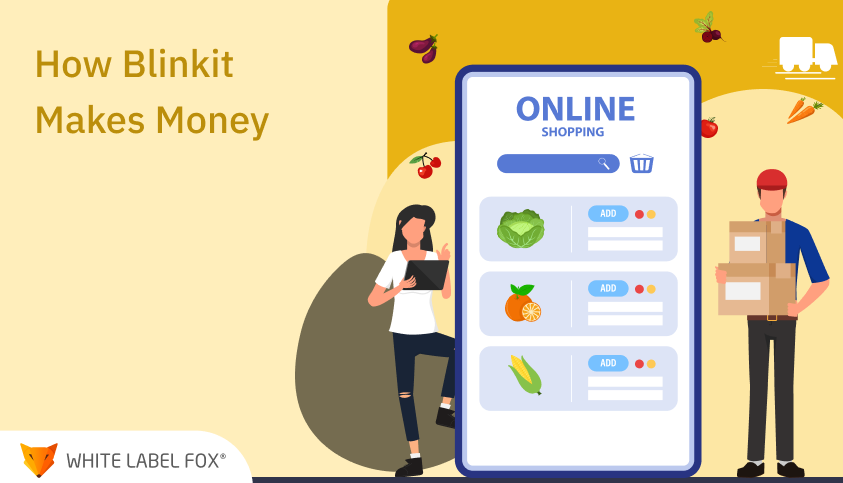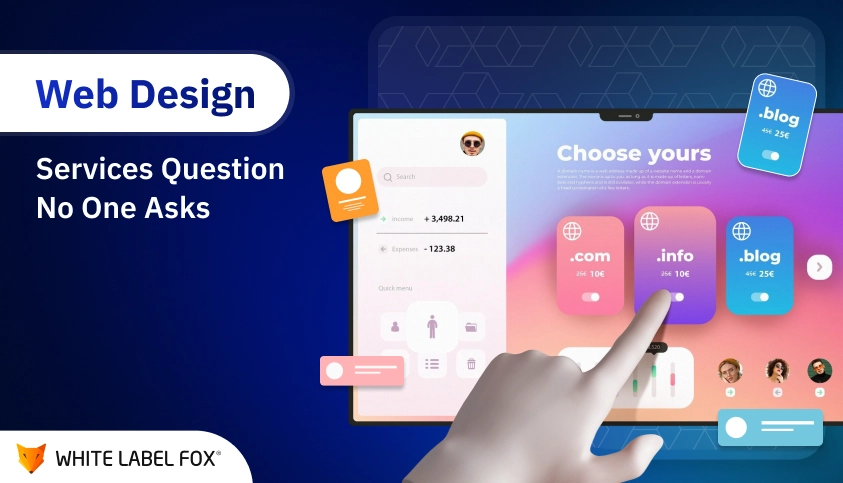Since its introduction in 1982, Blockchain has gained massive popularity across all business sectors. Blockchain technology is changing how financial transactions are carried out by businesses. From reducing operational costs to increasing transaction security levels, the technology has unlocked new financial transactions for business proprietors. Interested in learning more about how Blockchain technology is changing financial transactions for business owners?
What is Blockchain Technology?
One such database mechanism allowing for the simple transformation of information across a network is Blockchain technology. Chronologically consistent ones cannot be transferred, updated, or erased. Companies can implement this innovative tech for an immutable ledger creation.
A peer-to-peer computer network uses a network of smart systems as a public distributed ledger. The consensus algorithm protocol is what these blockchain-powered nodes work on. Various types of Blockchain include:
- Public Blockchain: Example, Bitcoin, Ethereum.
- Private Blockchain: Example, Hyperledger.
- Consortium Blockchain: Example, R3's Corda.
- Hybrid Blockchain: Private and public blockchain combination
How does Blockchain help with Business Transformation?
William Mougayar said that "Blockchain is the most disruptive technology I've seen in decades".
In 2024, the blockchain market measured $31 billion. The growth is measured due to the continuous starvation of secure transactions across different industries.
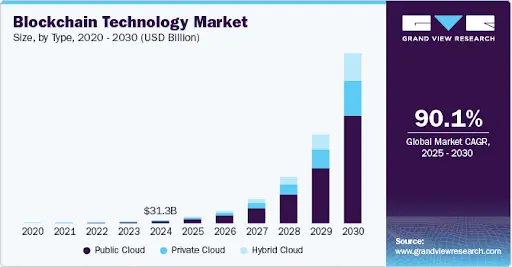
Source:
(Grand View Research)Transaction transparency provided by the Blockchain decentralized ledger system makes it appealing to various industries, including:
- Finance
- Healthcare
- Real Estate
- Retail
- Supply Chain Management
Businesses across all domains are investing in secure payment solutions to improve transparency and security. Walmart uses blockchain to improve its food supply chain by tracking the sliced mangoes.
After IBM and Walmart partnered with each other, an American multinational retail corporation invested in a food traceability system, helping the company track food within 2.2 seconds.

Source:
(Walmart)The secure nature of blockchain technology transforms every aspect of the business industry. Let's explore how blockchain drives these business transformations and paves the way to a secure ecosystem.
Reduce Transactional Complexities
Blockchain monetary transactions reduce complexities. Buyers and sellers can easily deal with each other with the help of this technology, assuring transparency throughout the experience.For instance, blockchain-enabled secure payment solutions such as Propy protect real estate business owners' data. Blockchain-enabled transaction management solutions do away with maintaining brokers and saving expenses.
Fight Against Fraud
Businesses of all sizes are moving ahead with blockchain and cryptocurrency adoption to fight against fraud and deliver high-quality products. To fight against seafood fraud, IBM and Raw-Seafoods partnered with each other. This helps to decrease fraud in an industry where mislabeling was on the rise.
A blockchain-based Avaneer Health was launched to share healthcare information with ease. Moreover, RealT is also using a blockchain-based platform to enable fractional property ownership. Secure financial transactions bridge the gap caused by traditional business infrastructure.
Secure Your Digital Transactions with Blockchain
Get a ready-to-use blockchain solution to boost transparency, reduce costs, and lead in the digital economy.

Improves Supply Chain Traceability
More than 94% of customers prefer brands that provide product origin. Blockchain technology provides a transparent ledger, enabling businesses to verify the whole supply chain journey. Blockchain-based solutions are used to track original products, ensuring food safety and decreasing the time required to resolve issues in case of fraud.
Secure Data Management
In 2024, data breaches were very common. However, data as well as security threats recorded were 422 million worldwide. Data breaches remain the biggest concern for companies as they lose sensitive details.
More than 67% of business owners keep cybersecurity at the top concerns. Blockchain enables users to create a decentralized database to ensure data security. Moreover, it enables healthcare providers to access and update patients' details effortlessly.
Decrease Costs
The decreasing remittance costs by just 5% can save approximately $16 billion each year says World Bank. Hence, it's not wrong to say that Blockchain makes transactions quicker.
For example, Ripple is one of the prominent blockchain-powered payment systems. Blockchain-based innovation has significant effects for businesses like yours in the majority of developing nations, giving rapid access to low-cost financial services.
Automate Business Process
The smart contracts were a $2 billion market. It's estimated to grow at a CAGR of 23%, reaching a $12 billion market value by 2032. Without a third-party involvement, this modern technology conducts contractual chores efficiently.
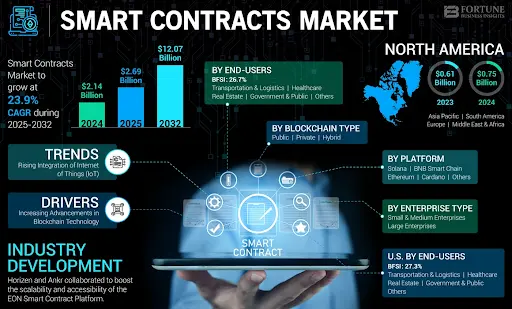
Source:
(Fortune Business Insights)A smart contract execution facilitates funds exchange and other forms of data manipulation, including land registry names. The whole operation can be automated by using Smart contracts in business, helping to improve transparency.
For instance, Ethereum's blockchain allows one to build decentralized applications (DApps) that use smart contracts to execute processes such as supply chain tracking, insurance claims, and royalty payments.
Blockchain Technology Applications for Various Industries
Undoubtedly, Blockchain is changing how industries operate. This transformation affects a traditional model and provides you with a lower-cost solution that makes business operations faster. It took years to create foundations for the economic system. Moreover, the adoption will be steady as the Blockchain wave will have great momentum.
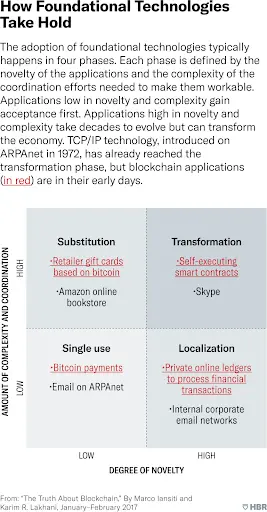
Source:
(HBR)Let's explore more about how Blockchain results in business transformation for various sectors.
Food Industry
Undoubtedly, the blockchain is revolutionizing the food industry. Many choose blockchain and cryptocurrency adoption to make it easier for their targeted customers to know the conditions under which the food product is produced, the whole journey, and more with ease.
We discussed before that Walmart is using this technology for seamless business operations. Similarly, TagOne uses a combination of AI, blockchain, and cloud computing to create a natural product supply chain.
Nestle also uses IBM Food Trust blockchain ledger to help its users trace the product's origin. Using Blockchain helps food brands to provide transparency to customers while increasing sustainability for farmers.
Financial Services and Banking
Traditionally, the financial system relied mostly on a centralized system, which caused human errors. The introduction of Decentralized Finance (DeFi) and secure payment solutions helps to tackle these issues effectively.
The US was the leading country in adopting Blockchain transportation. In 2019, more than 158 financial and banking service providers implemented this modern tech. Second was China with 56 blockchain-powered projects.
Decentralized Finance (DeFi) platforms enable peer-to-peer financial transactions without intermediaries, while secure payment systems reduce the risk of fraud. For example, JPMorgan's JPM Coin enables clients to make payments safely.
Real Estate
You might be unaware of how smart contracts in business are revolutionizing the way transactions are handled in real estate. In the past, buying and selling property needed extensive paperwork; now, this process is automated. With smart contracts in business, there is no need for intermediaries, minimizing the risk of disputes.
Healthcare
Boring healthcare systems of the past are outdated as they make patient data sharing tougher and also result in security breaches. Blockchain is now used to enhance the management of medical records and make medical systems more efficient. With Cryptocurrency adoption, healthcare providers are now providing a secure payment system to patients.
Additionally, blockchain ensures that medical data can only be accessed by authorized parties. A combo of smart contracts and blockchain helps to make insurance claims as well as pharmaceutical supply chain management more efficient. For example, the MediLedger network helps pharmaceutical companies verify drug legitimacy and manage supply chains.
Entertainment and Media
In the entertainment and media industry, artists and creators face various issues, like:
- Privacy;
- Unequal royalty distribution;
- Limited direct access.
However, Blockchain solves these issues by introducing smart contracts in business and secure payment solutions. Copyright protection provides undeniable original ownership proof. Smart contracts in business streamline royalty payments, which automatically distribute earnings to artists based on their agreement with the platforms.
Tokenized platforms allow fans to invest in and back their favorite artists' work. For example, a music streaming platform that is based on blockchain, Audius, gives artists more control of their earnings and content sharing.
How White Label Fox Helps You With Business Transformation with Blockchain?
Blockchain technology is changing how industries are adapting to this modern tech. Many industries are using blockchain to cut costs and streamline business operations. With cryptocurrency adoption and smart contracts in business becoming more prevalent, more and more brands are transforming their models for long-term growth.
As a business owner, if you are looking to integrate blockchain to streamline operations, White Label Fox can be your partner. From custom blockchain apps and cryptocurrency integration, we cover everything. With our expertise in on-demand and blockchain-powered app development, we can be a trusted partner in your digital transformation journey.
Blockchain is all about keeping up with the latest trends and future-proofing your business. Contact us at [email protected], and we will help you navigate this transformation.




